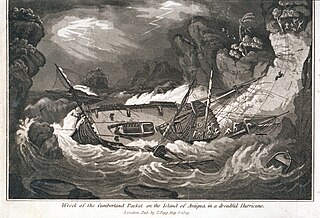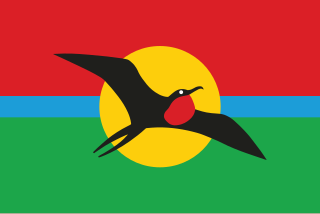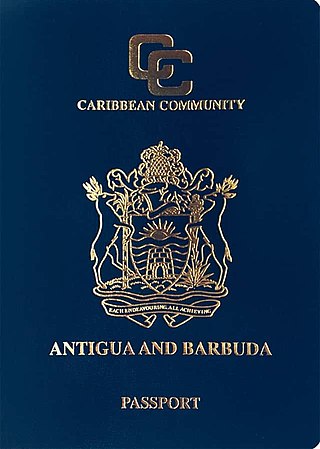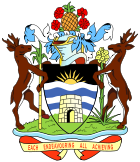
Antigua and Barbuda is a sovereign archipelagic country in the Caribbean. It lies at the conjuncture of the Caribbean Sea and the Atlantic Ocean in the Leeward Islands part of the Lesser Antilles.

The history of Antigua and Barbuda covers the period from the arrival of the Archaic peoples thousands of years ago to the present day. Prior to European colonization, the lands encompassing present-day Antigua and Barbuda were inhabited by three successive Amerindian societies. The island was claimed by England, who settled the islands in 1632. Under English/British control, the islands witnessed an influx of both Britons and African slaves migrate to the island. In 1981, the islands were granted independence as the modern state of Antigua and Barbuda.

Barbuda is an island and dependency located in the eastern Caribbean forming part of the twin-island state of Antigua and Barbuda as an autonomous entity. Barbuda is located approximately 30 miles (48 km) north of Antigua. The only settlements on the island are Codrington and its surrounding localities. Barbuda is a flat island with the western portion being dominated by Codrington Lagoon, and the eastern portion being dominated by the elevated plateau of the Barbuda Highlands, with salty ponds and scrubland spread throughout the island. The climate is classified as tropical marine.

Sir Vere Cornwall Bird, KNH was the first Prime Minister of Antigua and Barbuda. His son, Lester Bryant Bird, succeeded him as prime minister. In 1994, he was declared a "National Hero".

The Antigua and Barbuda Labour Party (ABLP) is a political party in Antigua and Barbuda. The current leader of the party is Gaston Browne, who serves as the Prime Minister of Antigua and Barbuda. The party had previously been led by Lester Bird, who was chairman of the party since 1971, and was Prime Minister and political leader in 1994.

The monarchy of Antigua and Barbuda is a system of government in which a hereditary monarch is the sovereign and head of state of Antigua and Barbuda. The current Antiguan and Barbudan monarch and head of state, since 8 September 2022, is King Charles III. As sovereign, he is the personal embodiment of the Crown of Antigua and Barbuda. Although the person of the sovereign is equally shared with 14 other independent countries within the Commonwealth of Nations, each country's monarchy is separate and legally distinct. As a result, the current monarch is officially titled King of Antigua and Barbuda and, in this capacity, he and other members of the Royal Family undertake public and private functions domestically and abroad as representatives of Antigua and Barbuda. However, the King is the only member of the Royal Family with any constitutional role.

West Indies Associated States was the collective name for a number of islands in the Eastern Caribbean whose status changed from being British colonies to states in free association with the United Kingdom in 1967. These states were Antigua, Dominica, Grenada, Saint Christopher-Nevis-Anguilla, Saint Lucia, and Saint Vincent.

Antiguan and Barbudan passports are issued to nationals of Antigua and Barbuda for international travel. The passport is a CARICOM passport as Antigua and Barbuda is a member of the Caribbean Community.
The Barbuda Land Acts establishes that the citizens of Barbuda communally own the land. The act specifies that residents must provide consent for major development projects on the island. The Government of Antigua and Barbuda passed the act on January 17, 2008.

Maria Vanessa Bird-Browne is a politician in Antigua and Barbuda. She was elected as a member of the House of Representatives for St. John's Rural East in the Parliament of Antigua and Barbuda in 2018, becoming the youngest lawmaker in the country. She is the country's minister for housing, lands, and urban renewal.
Antiguan and Barbudan nationality law is regulated by the 1981 Constitution of Antigua and Barbuda, the various Antigua and Barbuda Citizenship Acts, the Millennium Naturalisation Act of 2004, and various British Nationality laws. These laws determine who is, or is eligible to be, a national of Antigua and Barbuda. Antiguan and Barbudan nationality is typically obtained either on the principle of jus soli, i.e. by birth in Antigua and Barbuda; or under the rules of jus sanguinis, i.e. by birth abroad to a parent with Antiguan or Barbudan nationality. It can also be granted to persons with an affiliation to the country, by investment in the country's development, or to a permanent resident who has lived in the country for a given period of time through naturalisation. Nationality establishes one's international identity as a member of a sovereign nation. Though it is not synonymous with citizenship, rights granted under domestic law for domestic purposes, the United Kingdom, and thus the commonwealth, has traditionally used the words interchangeably.

Squatting in the island country of Antigua and Barbuda in the West Indies is the occupation of unused land or derelict buildings without the permission of the owner. Historically, native Barbudans were seen as squatters and after Hurricane Irma in 2017, Prime Minister Gaston Browne offered people he termed squatters the chance to buy their land.

Antigua and Barbuda and the United Kingdom of Great Britain and Northern Ireland (UK) are related through a long common history spanning from 1632 for Antigua, and 1678 for the smaller sister-isle of Barbuda through until 1981 for the joint-state. Antigua was one of the oldest English settlements in the West Indies, and served as a British hub of regional administration for the surrounding Leeward Islands.

Antigua, officially the Associated State of Antigua, was an associated state of the United Kingdom, which was established on 27 February 1967. The associated state was abolished on November 1, 1981, by the Antigua Order.
Royal tours of Antigua and Barbuda by its royal family have been taking place since the 20th century. Elizabeth II, Queen of Antigua and Barbuda, visited the country thrice: in 1966, 1977, and 1985.
Republicanism in Antigua and Barbuda is a movement for the replacement of the constitutional monarchy of Antigua and Barbuda with a republican form of government.
Antiguan and Barbudan English (ABE) or Antiguan and Barbudan Standard English is a dialect of English used in Antigua and Barbuda. ABE co-exists with Antiguan and Barbudan Creole.

Antigua and Barbuda is mostly of African descent, with Antiguans and Barbudans being classified into seven ethnic divisions as of the last census in 2011. In that census, 81,066 people declared their ethnicity, out of a total population of 86,295. In descending order, the largest ethnic groups are: Africans, other mixed, Hispanic, white, Indian, other, mixed (black/white), and Syrian/Lebanese. All inhabited parishes and dependencies in the country are majority-African.

At the 2011 census, there were 25,549 immigrants in Antigua and Barbuda, or 30% of the population. Immigrants usually originate from other Caribbean countries and places that have large Antiguan and Barbudan populations.

The Barbudan independence movement is a political movement that seeks the independence of Barbuda from Antigua. Proponents state that Barbudan independence would allow Barbudans to exercise their right to self-determination, especially after the start of the Barbuda land crisis, while opponents state that this movement would set a precedent for other small islands in the region to secede, and would deprive Antigua of critical resources.














